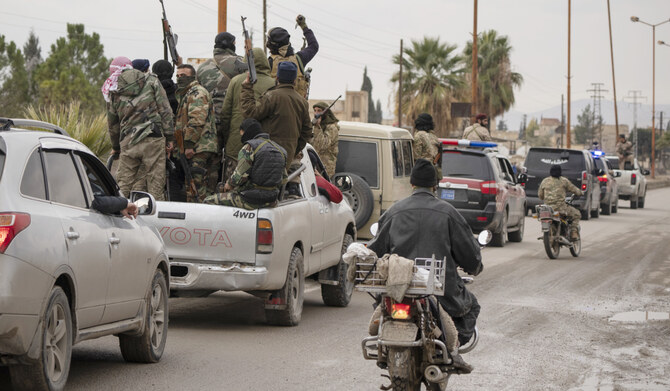DAMASCUS: Syria’s new rulers have installed some foreign fighters including Uyghurs, a Jordanian and a Turk in the country’s armed forces as Damascus tries to shape a patchwork of rebel groups into a professional military, two Syrian sources said.
The move to give official roles, including senior ones, to several militants may alarm some foreign governments and Syrian citizens fearful about the new administration’s intentions, despite its pledges not to export Islamic revolution and to rule with tolerance toward Syria’s large minority groups.
A Syrian government spokesperson did not reply to a request for comment on the thinking behind the appointments.
The sources said that out of a total of almost 50 military roles announced by the Defense Ministry on Sunday, at least six had gone to foreigners.
Reuters was not able to independently verify the nationalities of the individuals appointed.
HIGHLIGHTS
• Some foreign rebel leaders given senior military roles in Syria
• Move is ‘token of recognition’ of war role, source says
• HTS leader Sharaa purged some foreign fighters, now offers others citizenship
• China labels TIP a terrorist group, concerned about Uyghur militants
Thousands of Sunni Muslim foreigners joined Syria’s rebels early in the 13-year civil war to fight against the rule of Bashar Assad and the Iran-backed Shiite militias who supported him, giving the conflict a sectarian overtone.
Some foreign fighters formed their own armed groups while others joined established formations such as Daesh as it rampaged across Iraq and Syria, briefly declaring a so-called caliphate before being routed by US and Iran-backed forces.
Other groups of foreign militants joined HTS, which disavowed previous links to Al-Qaeda and Daesh and fought bloody battles against them before going on to spearhead the lightning advance that toppled Assad on Dec. 8.
Ahmed Al-Sharaa, the HTS-leader-turned de facto ruler of Syria, has purged dozens of foreign jihadi fighters as part of a campaign to Syrianize and moderate his group.
In remarks broadcast on Sunday, Sharaa said the new Syria “cannot be run by the mentality of groups and militias.”
Syria’s new rulers, drawn mainly from HTS, have indicated that foreign fighters and their families may be given Syrian citizenship and be allowed to stay in the country because of their contributions to the fight against Assad.
The Defense Ministry on Sunday announced 49 appointments to the army that included leaders of key Syrian armed factions.
Among them were several foreign fighters, three given the rank of brigadier-general and at least three others the rank of colonel, a Syrian military source said.
’TOKEN OF RECOGNITION’
“This is a small token of recognition for the sacrifices Islamist militants gave to our struggle for freedom from Assad’s oppression,” an HTS source told Reuters.
Chinese Uyghur militant Abdulaziz Dawood Khudaberdi, also known as Zahid and the commander of the separatist Turkistan Islamic Party’s (TIP) forces in Syria, was appointed a brigadier-general, a TIP statement said and the Syrian military source confirmed.
Two other Uyghur fighters, Mawlan Tarsoun Abdussamad and Abdulsalam Yasin Ahmad, were given the rank of colonel, said the TIP statement published on its website, congratulating them and the Uyghur community on the appointments.
All the names appear in Sunday’s Defense Ministry announcement, though the nationalities are not included.
The TIP is thought to have hundreds of fighters in Syria and aims to establish a Daesh in parts of China and central Asia, where there is a large Uyghur Muslim population.
Rights groups accuse Beijing of widespread abuses of Uyghurs, a mainly Muslim ethnic minority that numbers around 10 million in the western region of Xinjiang, including the mass use of forced labor in camps. Beijing denies any abuses.
There was no immediate comment from the Chinese foreign ministry.
China labels the TIP a terrorist organization responsible for plots to attack overseas Chinese targets. Beijing has said TIP “gravely threatens” China’s interests and security overseas and that combating the group was China’s “core concern” in its counter-terrorism effort.
Turkish citizen Omar Mohammed Jaftashi and Jordanian citizen Abdul Rahman Hussein Al-Khatib were also made brigadier-generals, the Syrian military source and the HTS source said.
Abdul Jashari, an ethnically Albanian fighter also known as Abu Qatada Al-Albani, was appointed colonel, the military source said.
Jashari head the Albanian militant group Xhemati Alban and was designated a militant by the US Treasury in 2016.
Egyptian Alaa Mohammed Abdel-Baqi was also given a military rank, the source said.
Egypt’s foreign ministry did not immediately respond to a request for comment.


























